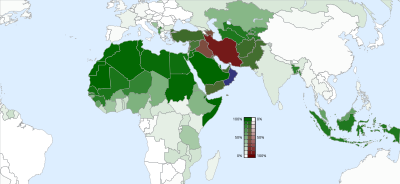
Back Pan-Islamisme Afrikaans وحدة إسلامية Arabic Panislamizm Azerbaijani Панисламизм Bashkir সর্ব-ইসলামবাদ Bengali/Bangla Panislamisme Catalan پان ئیسلامیزم CKB Panislamismus Czech Panislamisme Danish Panislamismus German

| Part of a series on Islamism |
|---|
|
|
Pan-Islamism (Arabic: الوحدة الإسلامية) is a political movement which advocates the unity of Muslims under one Islamic country or state – often a caliphate[1] – or an international organization with Islamic principles. Pan-Islamism was promoted by the Ottoman empire during the last quarter of 19th century by Sultan Abdul-Hamid II for the purpose of combating the process of westernization and fostering the unification of Islam.[2]
Pan-Islamism differentiates itself from pan-nationalistic ideologies, for example Pan-Arabism, by seeing the ummah (Muslim community) as the focus of allegiance and mobilization, including the Tawhid belief by the guidance of Quran and Sunnah's teachings, excluding ethnicity and race as its primary unifying factors.
The major leaders of the Pan-Islamist movement were the triad of Jamal al-Din Afghani (1839–1897), Muhammad Abduh (1849–1905) and Sayyid Rashid Rida (1865–1935); who were active in anti-colonial efforts to confront European penetration of Muslim lands. They also sought to strengthen Islamic unity, which they believed to be the strongest force to mobilize Muslims against imperial domination.[3] Following Ibn Saud's conquest of Arabian Peninsula; pan-Islamism would be bolstered across the Islamic World. During the second half of the twentieth century; pan-Islamists competed against left-wing nationalist ideologies in the Arab World such as Nasserism and Ba'athism.[4][5] At the height of the Cold War in the 1960s and 1970s, Saudi Arabia and allied countries in the Muslim World led the Pan-Islamist struggle to fight the spread of communist ideology and curtail the rising Soviet influence in the world.[6]
- ^ Bissenove (February 2004). "Ottomanism, Pan-Islamism, and the Caliphate; Discourse at the Turn of the 20th Century" (PDF). BARQIYYA. Vol. 9, no. 1. American University in Cairo: The Middle East Studies Program. Archived from the original (PDF) on September 23, 2015. Retrieved April 26, 2013.
- ^ "Pan-Islamism". Merriam-Webster.com Dictionary.
- ^ Motadel, David (2014). Islam and the European Empires. Great Clarendon Street, Oxford, OX2 6DP, United Kingdom: Oxford University Press. pp. 35, 175. ISBN 978-0-19-966831-1.
{{cite book}}: CS1 maint: location (link) - ^ Ali, Muhamad (2016). "4: Controlling Politics and Bureaucratising Religion". Islam and Colonialism: Becoming Modern in Indonesia and Malaya. The Tun – Holyrood Road, 12 (2f) Jackson’s Entry, Edinburgh, UK: Edinburgh University Press. p. 150. ISBN 978-1-4744-0920-9.
{{cite book}}: CS1 maint: location (link) - ^ Robert Worley, Duane (2012). "6: Post-Cold War Strategies". Aligning Ends, Ways, and Means. Washington DC, USA: Johns Hopkins University. p. 168. ISBN 978-1-105-33332-3.
- ^ M. Lüthi, Lorenz (2020). "20: The Middle East". Cold Wars: Asia, the Middle East, Europe. New York, NY 10006, USA: Cambridge University Press. p. 494. doi:10.1017/9781108289825. ISBN 978-1-108-41833-1.
{{cite book}}: CS1 maint: location (link)
© MMXXIII Rich X Search. We shall prevail. All rights reserved. Rich X Search